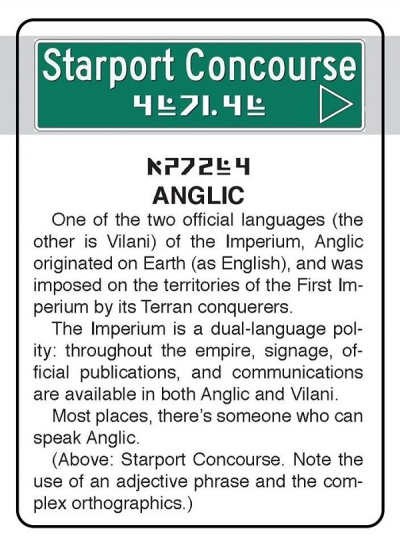Anglic
Anglic is a language that is used by the Solomani race of Humaniti wherever they reside. It is a hypercentral language and is often used as a lingua franca (trade language) throughout Charted Space. The dominant dialect of Anglic is called Core Anglic although lay people often use the terms interchangeably. There is a decidedly French influence on the Anglic of the Third Imperium. [1]
Description (Specifications)[edit]
Anglic (also known as Galanglic for "Galactic Anglic") is one of the official languages of the Third Imperium.
A distant descendent of Terran English, Anglic was used in the era of the Interstellar Wars and later the Rule of Man as a general communication language between people of the Terran forces -- even though most of them had a different mother tongue, depending on their country of birth.
On many worlds in the time of the Third Imperium, Anglic is only a second language used for system traffic control, commercial operations, and interstellar communications. Indeed, according to the initial waves of settlements a world has known in its history, the local language(s) may well be Vilani, a language from one of the many human civilizations which were incorporated into the first Imperium, or one of the Terran languages.
Image Repository[edit]
- Anglic is a language that dominates Charted Space as a trade language.

Structure[edit]
For the most part, most variations of modern Anglic use structures similar to Early 3rd Millennium English (Old Terran Calendar), as is still used on Terra.
Morphology[edit]
Morphology is the study of the internal structure of words. Most variations of modern Anglic use morphologies very similar to Early 3rd Millennium English (Old Terran Calendar), as is still used on Terra.
Phonology[edit]
Phonology, the study of the sound systems of a language. Most variations of modern Anglic use phonologies very dissimilar to Early 3rd Millennium English (Old Terran Calendar), as is still used on Terra.
Grammar[edit]
Grammar is the structure of a language.
Syntax[edit]
Syntax is the study of how words combine to form grammatical sentences.
Meaning[edit]
Etymology: Modern Anglic naturally includes words from various origins, notably many Vilani words. In addition the evolution of the language has made it completely different from the old Terran English.
Lexicology[edit]
See Anglic Lexicon
A lexicon is the word supply of a language.
- Word, lexeme, lemma, lexicon, vocabulary, terminology, etc.
Semantics[edit]
Semantics is the study of the meaning of words (lexical semantics), and how these combine to form the meanings of sentences.
Pragmatics[edit]
Pragmatics is the study of how language is used by its speakers.
Writing Systems[edit]
Anglic uses two primary scripts, both considered official:
History & Background[edit]
The First Imperium itself had several languages; it had been born out of a gathering of worlds which all had their own civilizations and linguistic history. However, given the centralized structure of the First Imperium, the Vilani language used on Vland imposed itself as a common language.
After the Terran forces conquered the First Imperium, Anglic became naturally the official language of the Rule of Man (or the Second Imperium, -2294 to -1776) and remained a common interstellar language for trade and commerce during the Long Night. At the founding of the Third Imperium, the official language of the Sylean Federation was Sylean, but Anglic was in widespread use throughout Core Sector. As the Imperium recontacted and absorbed other states, it was found to be the most commonly encountered language for trade and soon became dominant.
Variant Dialects[edit]
The Third Imperium has not been able to prevent the emergence of a wide variety of Anglic dialects. That said, interstellar communications, holocrystals, and recordings help to spread a uniform pronunciation of Anglic throughout the entire Imperium. Within the Imperium, any Anglic speaker can understand almost any other, but isolated communities on worlds with little contact with the interstellar trade lanes shift their speech patterns to form dialects. Notable examples include worlds of the Tenjada Moralitate, the Solomani Preserve, and the various polities of Holowon Sector, Amderstun Sector, and especially Katoonah Sector.
In addition, broad areas within the Third Imperium have established their own pronunciation patterns; accepted dialects include:
- Rim (which includes Terra)
- Core (the central region of the Imperium)
- Riftian (the spinward frontiers)
- Transform (the Antares region)
- Galaach, an Anglic derived trade language used in the former Ushran Empire.
In addition to different formal dialects there are thousands of individual pidgin and creole languages that have developed from Anglic, especially on backwater worlds that retain a different local language entirely. A trader might be able to communicate in formal or pidgin Anglic at a starport, and find that the natives a kilometer away speak an unintelligible dialect known only to natives.
- Caledonian Anglic, used alongside the archaic Celtic Dialect of Gheldaght, is the dialect used by the Principality of Caledon. It is filled with obscure and archaic words and highly variant pronunciations.
- Caledonian Anglic is also spoken in the Confederacy of Duncinae.
- Julian Anglic, an offshoot of Transform, is used in the Julian Protectorate.
- "Changlic" is a contemporary Anglic daughter language with many loan words and features derived from Terran Asian origins. Some linguists still call it a pidgin while others salute its linguistic originality. Use of the language has been growing within Crucis Margin Sector.
- The Enlis dialect is the primary language of the Carter Technocracy.
- The Gralynan dialect is the primary language of a small independent state controlling Gralyn and Botany Bay, on the Drinsaar Loop in Reaver's Deep.
- The Siri dialect is spoken in parts of Mavuzog Sector.
- Great Ape Language (GAL), a language containing many elements of Anglic spoken within Uplifted Ape communities.
- Each world where it is spoken has its own unique dialect.
Corrupted Dialects[edit]
On some worlds, where settlers or workers were stranded during the Long Night or where old colonial missions went astray, surviving Humans built societies cut off from interstellar contact. When contact was re-established centuries later, linguistic drift had often produced interesting variants on Anglic.
One example is the language of the Bye-Ren, or in their own tongue "Los-son" -- thought to derive from "Lost Ones".
Another example is the planet Wal-ta-ka (Deneb 2713). The etymology of this world's native name is certainly from the Anglic, but the exact origin is debated. Some claim that it is a corruption of "Wellington", as Wellington Interstellar Miners was the corporation for whom the stranded miner populations that formed the original society worked. Others argue that it is from "Wall (of) the Catastrophe", with the narrow habitable twilight band on which the locals live being the "wall" shielding them from the climate extremes of either hemisphere. Anglic heritage on Wal-ta-ka is obvious in names and titles:
- Torbal Ta-Ged (Torbal the Good)
- Tabor San-Seyidd (Tabor, son of Seyidd)
- Rila Maras-Laku (Rila, wife of -- i.e. "marriage" -- Laku)
The Otraic language is also a derived form of Anglic.
Worlds & Sectors (Astrography)[edit]
This language is primarily in use in the following areas:
Charted Space:
- Especially the Solomani Confederation and Third Imperium
Homeworld[edit]
The homeworld of this language is:
World Listing[edit]
This language is known to be in use on the following systems and worlds:
| startbacknext(179 listed) |
References[edit]
- Gary L. Thomas. Grand Census (Digest Group Publications, 1987), 8.
- Marc Miller. Imperial Encyclopedia (Game Designers Workshop, 1987), 17.
- Marc Miller. Players' Manual (Game Designers Workshop, 1987), 33.
- Loren Wiseman. GURPS Traveller Core Rules (Steve Jackson Games, 1998), 20.
- Colin Dunn. Library Data (Mongoose Publishing, 2011), 4.
- Marc Miller. Agent of the Imperium (Far Future Enterprises, 2015), 188. (v1.1 - Annotated)
- Jae Campbell. Encyclopaedia Dagudashaag (Signal-GK, 2017), 119.
- Christopher Griffen. The Third Imperium (Mongoose Publishing, 2021), 4.
- ↑ Marc Miller. Agent of the Imperium (Far Future Enterprises, 2015), 249.
